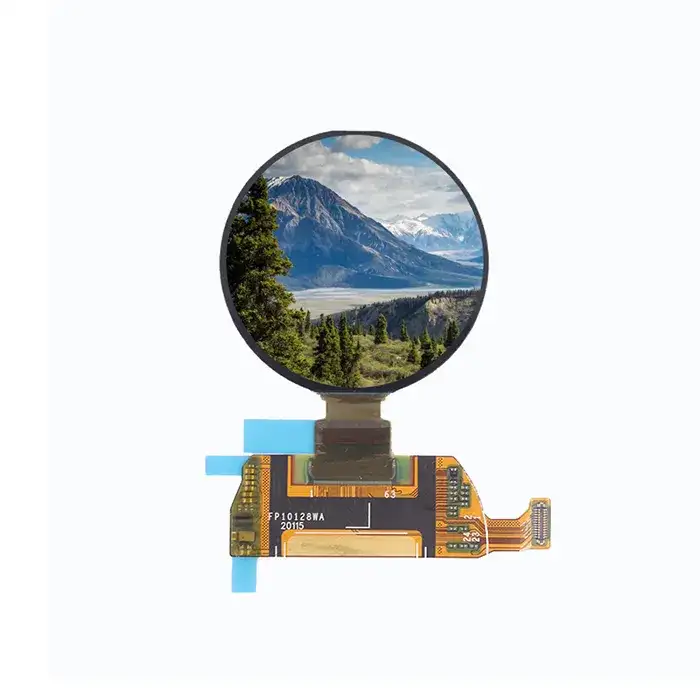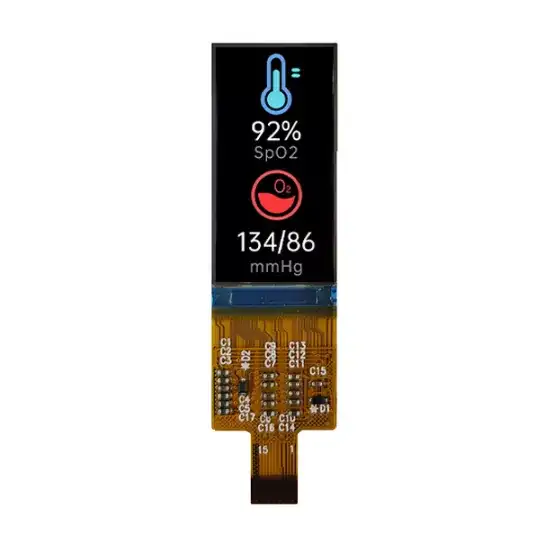
- English
- Español
- Português
- русский
- Français
- 日本語
- Deutsch
- tiếng Việt
- Italiano
- Nederlands
- ภาษาไทย
- Polski
- 한국어
- Svenska
- magyar
- Malay
- বাংলা ভাষার
- Dansk
- Suomi
- हिन्दी
- Pilipino
- Türkçe
- Gaeilge
- العربية
- Indonesia
- Norsk
- تمل
- český
- ελληνικά
- український
- Javanese
- فارسی
- தமிழ்
- తెలుగు
- नेपाली
- Burmese
- български
- ລາວ
- Latine
- Қазақша
- Euskal
- Azərbaycan
- Slovenský jazyk
- Македонски
- Lietuvos
- Eesti Keel
- Română
- Slovenski
- मराठी
- Srpski језик
Why Are OLED Displays Revolutionizing Our Driving Experience
As someone who has spent over two decades navigating the tech landscape, primarily at Google, I have witnessed countless technological cycles come and go. The shift from clunky, single-purpose devices to the seamless, integrated digital experiences we enjoy today has been remarkable. Now, I see a similar transformation happening in a place we all spend a significant amount of time our cars. The heart of this change is the rapid adoption of the OLED Display. For years, in-car screens were functional at best, often laggy, washed-out, and a source of driver frustration. Today, at Victronix, we are partnering with leading automotive manufacturers to change that narrative, embedding cutting-edge OLED Display technology that doesn't just show information but enhances the entire journey.
What Makes an OLED Display Technologically Superior for Automotive Use
To understand the shift, we need to look under the hood, not of the car, but of the screen itself. An OLED Display is fundamentally different from the traditional LCDs we are used to. LCDs require a backlight that shines through a layer of liquid crystals. OLEDs, which stands for Organic Light-Emitting Diode, are emissive. This means each pixel generates its own light. When a pixel needs to be black, it simply turns off. This core difference unlocks a cascade of benefits that are perfectly suited for the demanding automotive environment.
Let us break down the key technical parameters where OLED Display technology excels
-
Perfect Blacks and Infinite Contrast Since pixels can turn off completely, blacks are truly black, not dark gray. This creates an infinite contrast ratio, making graphics, maps, and interfaces pop with a depth and clarity impossible on LCDs.
-
Wider Viewing Angles Color and brightness remain consistent even when viewed from extreme angles. This is crucial for both the driver's display and the center console, ensuring the passenger gets the same perfect view.
-
Faster Response Time OLED pixels can switch on and off much faster than their LCD counterparts. This eliminates motion blur in fast-moving graphics and scrolling text, a critical factor for safety and a premium feel.
-
High Brightness and HDR Capability Modern automotive OLED Display units are engineered to achieve high peak brightness, making them perfectly readable in direct sunlight. Combined with their perfect blacks, they are ideal for High Dynamic Range (HDR) content, offering a richer visual palette.
-
Flexible and Curved Designs The organic layers in an OLED are inherently flexible. This allows manufacturers to create stunning, curved displays that wrap around the driver, creating an immersive cockpit experience that was previously a design fantasy.
The table below provides a clear, professional comparison of these core attributes
| Display Parameter | Traditional LCD | Victronix-Enhanced OLED Display |
|---|---|---|
| Contrast Ratio | Typically 1000:1 to 2000:1 | Effectively Infinite |
| Viewing Angle | Color shift and dimming beyond 120 degrees | Minimal shift up to 170 degrees |
| Response Time | 5-10 milliseconds | < 0.1 milliseconds |
| Form Factor | Rigid, flat panels | Flexible, curved, and free-form designs |
| Power Consumption | Constant backlight drain | Pixel-level control, more efficient for dark interfaces |
How Does an OLED Display Directly Enhance Driver and Passenger Experience
Technology for technology's sake is meaningless. The real value of an automotive OLED Display lies in how it tangibly improves the time we spend inside the vehicle. From my perspective, it is about solving real user pain points.
First, the readability. The combination of high brightness and perfect contrast drastically reduces eye strain. Glare, especially during dawn or dusk, is minimized. The digital instrument cluster becomes more than just a screen; it feels like a high-definition window into the vehicle's soul, presenting vital information with stunning clarity.
Second, it enables design freedom. At Victronix, we are working with designers who are no longer constrained by rigid rectangles. We can create sweeping, seamless digital dashboards that blend elegantly into the interior trim. This "wow" factor is immediate and leaves a lasting impression of luxury and innovation.
Finally, it future-proofs the vehicle. As software-defined cars evolve with more advanced animations, richer maps, and even entertainment features for passengers, the display is the canvas. A high-performance OLED Display ensures this canvas is ready for tomorrow's applications without feeling slow or outdated.
What Are the Critical Specifications of a Victronix Automotive OLED Display
When selecting a display partner, automakers dive deep into the specifications. At Victronix, we pride ourselves on not just meeting but exceeding industry benchmarks. Our engineering focus is on reliability, performance, and longevity specifically for the harsh automotive environment. Here is a detailed look at the specifications of our flagship automotive OLED Display module.
| Specification | Victronix VX-AutoOLED Pro Series |
|---|---|
| Screen Size Range | 12.3-inch to 38.0-inch Curved (Customizable) |
| Resolution | Up to 8K (7680 x 4320) |
| Peak Brightness | > 1000 nits (Full Screen), > 1500 nits (Peak HDR) |
| Color Gamut | 99% DCI-P3 |
| Operating Temperature | -40°C to +105°C |
| Lifespan (LT80) | > 15,000 hours at 1000 nits |
| Pixel Density | > 400 PPI (Pixels Per Inch) |
| HDR Support | HDR10, HDR10+, Dolby Vision |
| Interface | Automotive-grade LVDS & APIX® |

Can an OLED Display Withstand the Demands of a Vehicle FAQ
We often get questions from our partners and end-users about the practicalities of this technology. Here are some of the most frequent ones.
FAQ 1 Is the OLED Display susceptible to screen burn-in
This is a common and valid concern. Modern automotive-grade OLED Display units from reputable suppliers like Victronix incorporate several advanced mitigation techniques. These include pixel shifting, dynamic refresh rate adjustment, and logo detection algorithms that subtly dim static UI elements. Combined with the high-grade organic materials designed for longevity, the risk of permanent burn-in over the vehicle's lifespan is extremely low.
FAQ 2 How does an OLED Display perform in direct sunlight
Extremely well. Our Victronix modules are specifically engineered with high-luminance efficiency and advanced optical bonding techniques. This process reduces internal reflection and air gaps, allowing the screen to project its light more directly to the viewer and combat ambient light reflection effectively. The result is excellent readability even under the brightest summer sun.
FAQ 3 Are OLED Displays more power-hungry than LCDs
It depends on the content. This is where the emissive nature of an OLED Display becomes a power-saving advantage. In a typical automotive UI with dark themes and black backgrounds, a significant portion of the pixels are off, consuming zero power. An LCD's backlight, however, is always on regardless of the content. Therefore, for modern, thoughtfully designed interfaces, an OLED Display can be significantly more energy-efficient.
Are You Ready to Integrate the Future of Automotive Displays
The move towards the OLED Display in vehicles is not a fleeting trend; it is a fundamental upgrade driven by tangible benefits in safety, design, and user experience. It addresses the core frustrations of the past and opens up a new realm of possibilities for the connected car of the future. At Victronix, we are not just observers of this revolution; we are active pioneers, crafting the very components that make it possible. We understand that the dashboard is the new digital cockpit, and it deserves the best canvas available.
If you are an automotive designer, engineer, or decision-maker looking to define the next generation of in-car user experience, the conversation starts with the display. Contact us today to discuss how our Victronix OLED Display solutions can bring your vision to life with unparalleled clarity, reliability, and innovation. Let us build the future of driving, together.





